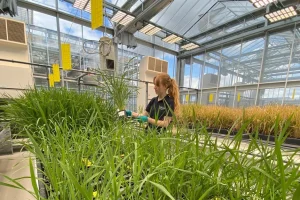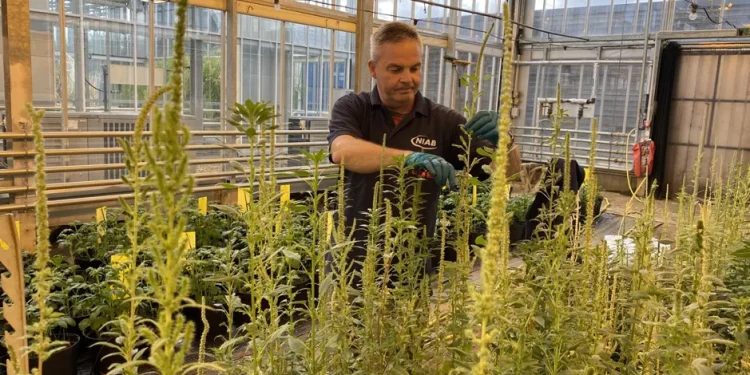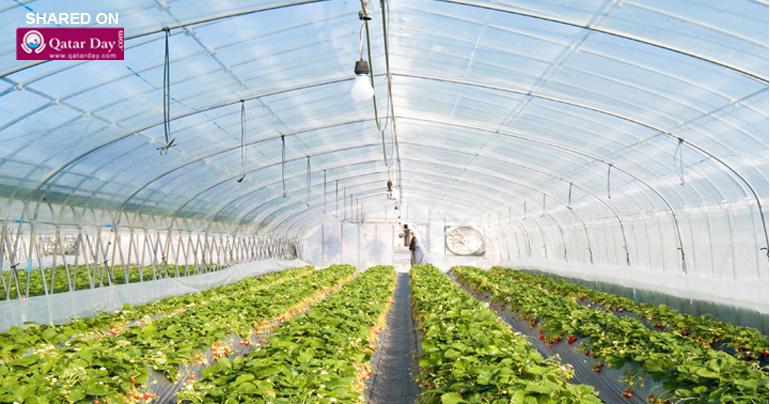For over a century, NIAB (National Institute of Agricultural Botany) has been a cornerstone of agricultural advancement, applying plant science to improve crop yields, sustainability, and overall farming efficiency. Today, NIAB continues to push the boundaries of agricultural research, blending traditional practices with innovative projects that address the challenges of modern farming. This article provides an overview of the groundbreaking work taking place at NIAB’s MacLeod Complex Glasshouse facility, located just outside Cambridge, and highlights several key projects that are paving the way for future agricultural success.
Innovate UK Project: Enhancing Rice Yields
One of NIAB’s most ambitious initiatives is a 24-month project in collaboration with a research partner, funded by Innovate UK, aimed at increasing rice yields. Led by Danni Bryce, the project is currently in the phase of monitoring crop growth, with yield assessments planned for later this year. This project is particularly significant as it addresses the global need for enhanced rice production, a staple food for over half the world’s population. The outcomes could have far-reaching implications for food security and the economic stability of rice-producing regions.
Seed Bulking Service: Supporting Crop Diversity
NIAB’s seed multiplication and maintenance service is another critical component of their work, ensuring the availability of high-quality seeds for a diverse range of crops. Stephen Morley, a key member of this team, is currently harvesting Amaranthus seeds as part of a broader effort to support crops such as barley, cowpea, legumes, lentils, maize, soy, and wheat. This service is vital for maintaining genetic diversity and ensuring the resilience of crops in the face of changing climate conditions and growing global demand.
Facility Improvements: Enhancing Research Capabilities
Under the leadership of Pete Baker, NIAB is making significant upgrades to their glasshouse benches. These improvements are designed to enhance the facility’s research capabilities, allowing for more precise and controlled experiments. By modernizing their infrastructure, NIAB is positioning itself to continue leading agricultural innovation for the next century.
Peat-Free Growing Media Trials: Pioneering Sustainable Horticulture
In response to the horticultural industry’s shift towards more sustainable practices, Amanda Southwell is spearheading trials on peat-free growing media. These trials are crucial as the industry moves away from peat, a non-renewable resource, in favor of more environmentally friendly alternatives. Amanda’s work focuses on evaluating novel mixes for their performance and quality, providing essential insights that will help guide the industry’s transition to sustainable growing practices.
Biostimulant Trials: Boosting Crop Yields
As interest in biostimulants continues to grow, NIAB is at the forefront of testing these products for their potential to increase crop yields. Tara, a researcher at NIAB, is currently harvesting tomato trials to assess the effectiveness of biostimulants. These trials could lead to the development of new methods for boosting crop productivity without relying on traditional chemical inputs, aligning with the global push for more sustainable agricultural practices.
Lawn Variety Demonstrations: Showcasing Grass Seed Performance
In addition to their work with food crops, NIAB is also involved in evaluating lawn varieties. Ben Tea is preparing demonstration plots that showcase the performance and characteristics of both new and established grass seed varieties. This project not only supports the landscaping and sports industries but also contributes to the development of more resilient and sustainable turf solutions.
Through these diverse projects, NIAB demonstrates its commitment to advancing agricultural science and supporting the industry in adapting to the challenges of the 21st century. For entrepreneurs and investors looking for opportunities in the agricultural sector, NIAB’s work offers a glimpse into the future of farming, where innovation meets sustainability.










